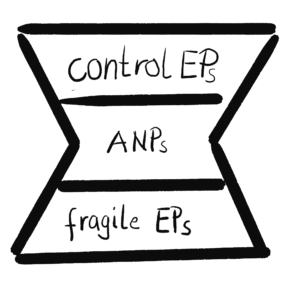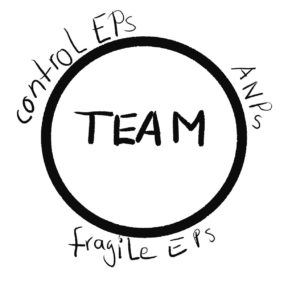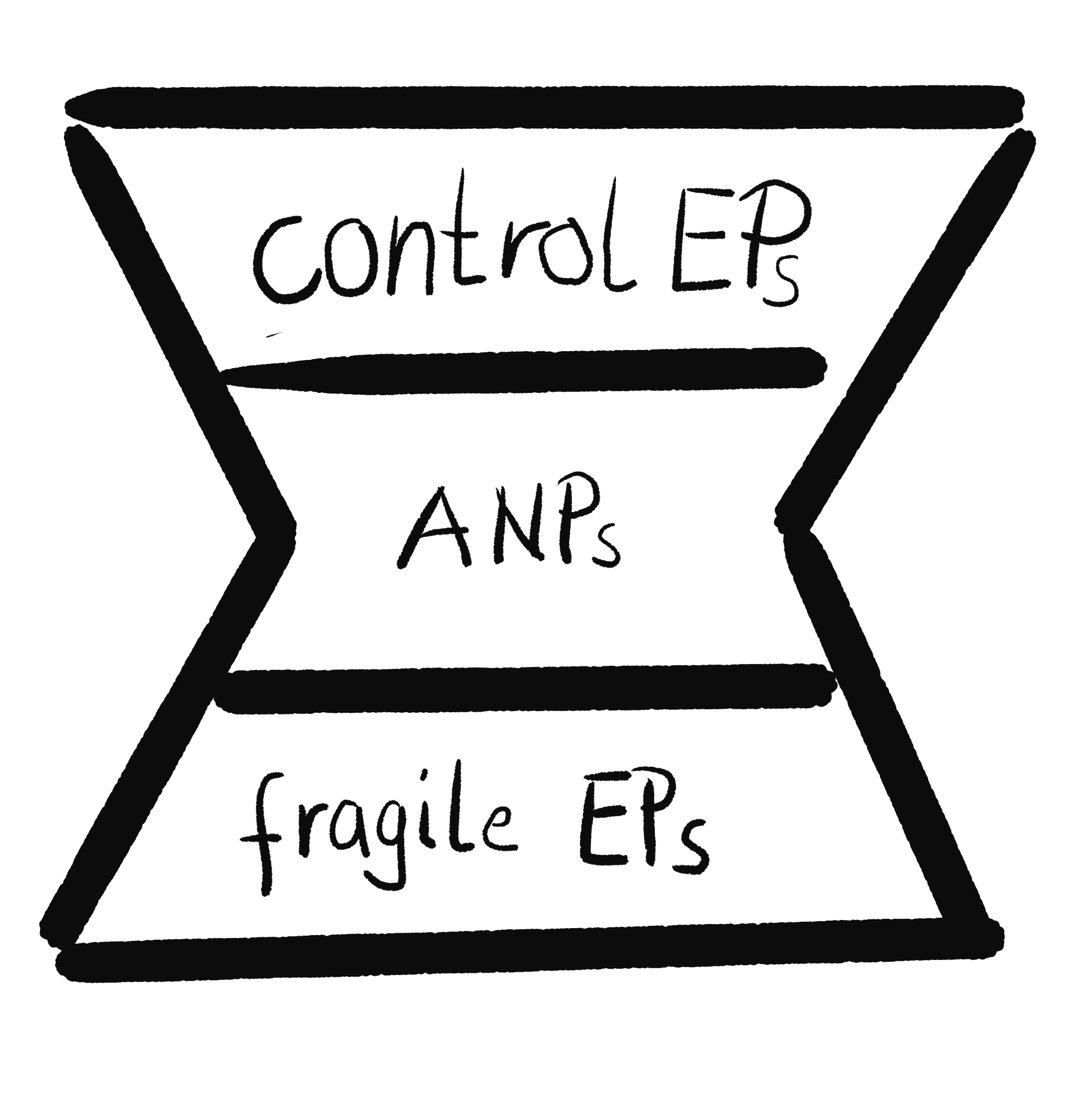
hierarchy
Most people with DID experience some kind of hierarchy among the different parts. There are those who tell everyone what to do, call them controlling EPs, managers, gatekeepers, abuser-imitating parts, protectors or diplomatically, ‘advisors’. Their job is to keep everyone functioning and in line to avoid failure, punishment or pain.
Then there are those who do their best to follow the instructions, keep life going and the system functioning. ANPs and Hosts often live with pressure from all directions.
Fragile EPs are low in the hierarchy and endure a lot of rejection from the top, but they also turn toward the hosts with their desperate needs. And there are usually a lot more fragile EPs than hosts.
This hierarchy isn’t inherently bad. During TraumaTime this was the most functional way to exist. A strict organization with specific people giving orders and specific people obeying them helps manage crisis situations. The problem is, we aren’t in constant crisis anymore. The world demands different skills today.
While ANPs are sometimes a bit naive about possible danger and fragile EPs are not suited for managing daily life, the controlling EPs are not always properly oriented in time. When they are stuck in the past their judgement of today’s situations will not be perfect. Knowledge about today will be limited, which impacts problem solving abilities. The lack of new life experience and creativity shows because they tend to use old coping skills over and over again, even if they don’t fit anymore.
Outdated leadership style
What we can observe is an outdated leadership style similar to what used to be done in companies after the industrial revolution. The bosses decide, everyone else has to obey. The goal is to prevent failure. The downsides of this leadership style is that it isn’t open for new things. There is no growth and no learning, just a repetition of old patterns like in an assembly line. The dominant feeling is fear. Those who have to obey fear failure and punishment and do everything to avoid it, including cheating. And the bosses are isolated and scared that all their pressure might still not be enough. Because they are outside the work-force and don’t interact, they have little influence except for punishment/firing people. It doesn’t feel good. It feels lonely and helpless.
And in the end it doesn’t work that well. Hosts burn out. Some systems have to replace hosts every couple of years because nobody can keep up with this. And fragile EPs cannot be kept under control. Over time the pressure will just cause more disruptions, uncontrolled switching, amnesia and out of control behavior. The old times are over, the world has changed. We need to change too.
New organization
When we search for a new way to organize ourselves we can look at modern leadership styles. Then we are confronted with a new concept: teamwork. There might still be a group that defines the goals, but the process of reaching them is radically different. We are not in an assembly line anymore where we do one task and then switch to another part to continue with life. Everyone needs to contribute. That way the organization can profit from all the different life experiences and expertise that exists within the team. In DID that means being open to listen to every part, knowing that they might have information the others lack, even if they are ‘just’ a fragile EP. A leader guides the conversation and keeps it on topic, they don’t control what everyone can share or how they should feel or behave.
I know this is a wildly different mindset, but in this new way of life failure can be embraced as a necessary step for learning. If we already knew how to do it, no learning was needed. But when we have to figure things out first failure is inevitable for progress (More about that here). That takes the pressure to perform perfectly from all the team members. The energy formerly spent on hiding issues or cheating can now be focused on doing the best we can and learning from it so next time we can do better. Without punishment there is no fear and people thrive in a fear-free atmosphere. We move away from merely trying to prevent something bad and toward building something beautiful.
Changing mindsets
To get there we need to win over the big bosses in our system. If we are lucky they are the rational kind and they will understand that this change will benefit the whole system. It lifts a lot of pressure off them because they don’t have to keep everyone in line when the team is already working on the same goal. Most controlling EPs don’t enjoy punishing others, they just do it because there seems to be no other way. Well there is. Modern companies work with this new concept for organizing work because it fits modern demands and companies are just a kind of system too.
The most important thing for controlling EPs to realize is that errors, failure or messes won’t lead to death. It is what we learned as children when we got punished but we are an adult now and there is nobody there who would cause us to die. Look around. There will only be the mess to clean up but nobody is waiting for us to fail so they can punish us. We live in a new world now. The inhuman pressure of having to be perfect, to know everything and be able to do everything without ever learning it is gone. The leadership skills needed today are oversight, encouragement, moderating discussions, communicating vision for the future and listening. Lots of listening. Not everything needs to be done but everything needs to be heard. It takes time to learn how to operate in this completely new job but there is grace for learning and a team can be supportive. Turns out, they have things to give too. It doesn’t all depend on the bosses.
As controlling EPs learn to listen, fragile EPs can learn to speak up. What we have to say is important for the whole team. Nobody else has our unique insight. Things won’t work unless we share our ideas, knowledge and needs so the rest of the team can include them in their plans and actions. It can take some time to grow trust that nobody will punish us for speaking up, especially if we have been silenced before. Fear of the big bosses can sit pretty deep but it is also common knowledge how much courage lives in the parts who usually stay in the shadows. The team needs us. Wait for the controlling EPs to grasp the idea of teamwork before you share with them. Hosts can be easier to cooperate with at first.
Hosts have to be aware that they don’t know everything. We easily fall for the illusion that we do. While we are good at things concerning everyday life we usually lack awareness in other important areas. It isn’t unusual to have to ask other parts if the body is hungry or needs the bathroom and if the people we interact with are even safe. Ignoring other parts isn’t working in this new life we want to create. Listening doesn’t have to mean being flooded. It is important to agree on containment of trauma content to make collaboration safe for ANPs too.
Communication for collaboration
One of the big struggles in DID is to establish communication. It is scary. We have bad experiences with being flooded or getting criticized relentlessly. Mutual rejection maintains the dissociation, the very thing that keeps us from functioning and having a better life. It is hard work to overcome the fear of listening and of speaking up. Establishing communication is one of the big milestones in DID therapy. Yet it is the foundation for all teamwork. If we want this new kind of life, we need to find the courage to learn to communicate. It is ok to start small, it is a learning process after all. The safer we make it to speak up the easier it will be.

round table
This is a major paradigm shift. It turns the inner relationships upside down and demands a whole new way of thinking. We cannot enforce this shift through revolution, power struggles or punishment. That just leads to an inner civil war. We need to create a safe inner culture where fear isn’t welcome anymore. The prospect of a life without fear and punishment is attractive for everyone. Even those who used to spread fear and punishment. A culture of safety will allow the system to thrive.
If you want to learn more, I recommend reading The Fearless Organization by Amy Edmondson. It colorfully explains why the old leadership style has to go, with real life stories of companies that can help everyone in the system understand why this is crucial.


Thank you for this, I’m going to need some time to digest it but it is exactly the key to an idea/ feeling/ half formed thought that has been bothering me for a few weeks.